As fears grow of a wider conflict in the Middle East, the war between Israel and Hamas appears to be deepening the divide between the U.S. and its allies on one side and China and its partner Russia on the other.
The divide has been apparent this week at the United Nations Security Council, where efforts to pass a resolution in response to the conflict were stymied by disagreements among members including the U.S., Russia and China, all of whom wield vetoes.
As of Saturday, the conflict has killed more than 4,000 people in the Gaza Strip and 1,400 people in Israel, with at least 32 Americans, 19 Russians and four Chinese among the casualties.
While President Joe Biden has emphasized U.S. support for Israel, condemning Hamas’s brutal Oct. 7 attack and backing “restrained” retaliation by Israeli forces, Presidents Xi Jinping of China and Vladimir Putin of Russia have taken a different approach.
In a broadly similar response, the two leaders have condemned attacks on civilians, urged a cease-fire and offered to mediate, while failing to explicitly condemn Hamas.
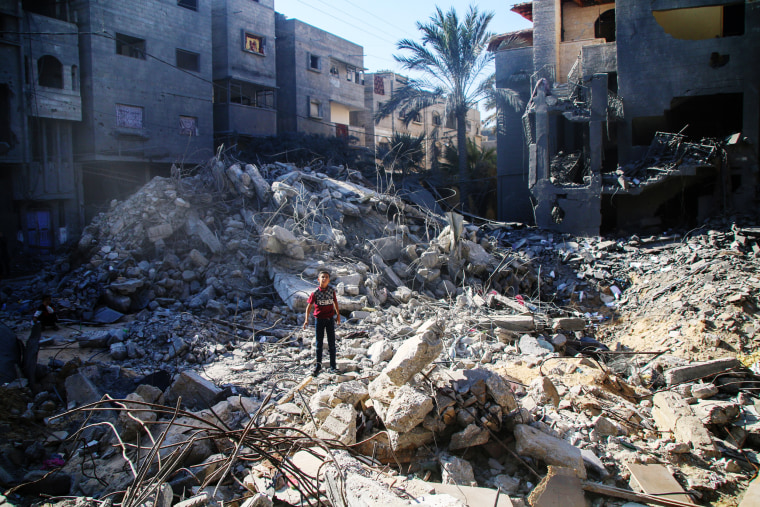
Both have said the solution to the conflict lies in the establishment of an independent Palestinian state, and in a meeting Thursday, China and Russia reaffirmed their shared position on the issue and said they were closely coordinating their Middle East policy.
“The fundamental reason the Palestinian-Israeli conflict has reached its current state is that the legitimate national rights of the Palestinian people have not been protected,” China’s Middle East envoy Zhai Jun told his Russian counterpart, Mikhail Bogdanov, in Qatar, his first stop on a trip to the region.
“They’re trying to keep their relationships stable,” Robert Sutter, a professor of international affairs at George Washington University, said of China and Russia. “But obviously they’re tilting away from the Israelis and tilting toward the Palestinians.”
China and Russia, who had already declared a “no limits” partnership weeks before Putin launched his invasion of Ukraine in February 2022, have only grown closer as their ties with the West have deteriorated.
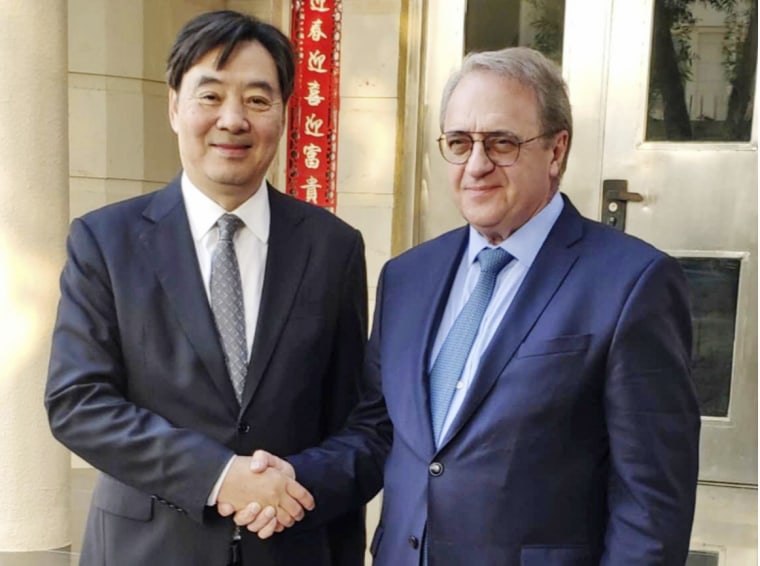
China, which has supported Russia’s war politically and economically, sees Moscow as an important partner in its efforts to sell developing countries on Xi’s vision of an alternative world order less dominated by the U.S. and its democratic allies.
The two countries’ strong ties were underscored this week by Putin’s appearance at a global gathering in Beijing for the 10th anniversary of Xi’s signature Belt and Road initiative. The trip was Putin’s first outside the former Soviet Union since an international arrest warrant was issued for him in March over the Ukraine war.
Putin’s attendance was less about the initiative, which Russia is not part of, than showing he still has powerful friends, said Alexey Maslov, director of the Institute of Asian and African Studies at Moscow State University.
Xi tried to show “the greatest respect” for Putin, Maslov said, adding that he put the Russian leader “at the same line, the same level as himself.” He noted that the two leaders entered the event at the Great Hall of the People side by side.
Xi did not mention the Israel-Hamas conflict in his speech at the Belt and Road Forum. His officials have been more direct, with Foreign Minister Wang Yi telling the Saudi foreign minister last week that Israel had “gone beyond the scope of self-defense” and should “stop its group punishment” of people in Gaza, the Palestinian enclave from which Hamas launched its attack.
Israel has expressed “deep disappointment” with China’s response to the Hamas attack, in which whole families were slaughtered and an estimated 200 people, including children and older people, were taken as hostages.
“From an Israeli perspective, this was Israel’s 9/11 or even worse,” said Gedaliah Afterman, head of the Asia Policy Program at the Abba Eban Institute for International Diplomacy in Israel, “and the Chinese treated it as if it’s just another round.”
Any country that wants to play a role in the Middle East needs to have a “more balanced approach,” said Amir Lati, the Israeli consul general in the Chinese territory of Hong Kong.
“We expect countries, especially countries that we see as friendly to Israel, to treat these horrific crimes as terrorism,” he said, “and we were disappointed with some countries that were more ambiguous about condemnation of these acts.”
Calling for a two-state solution is beside the point, Lati added, as it is not an idea that Hamas supports.
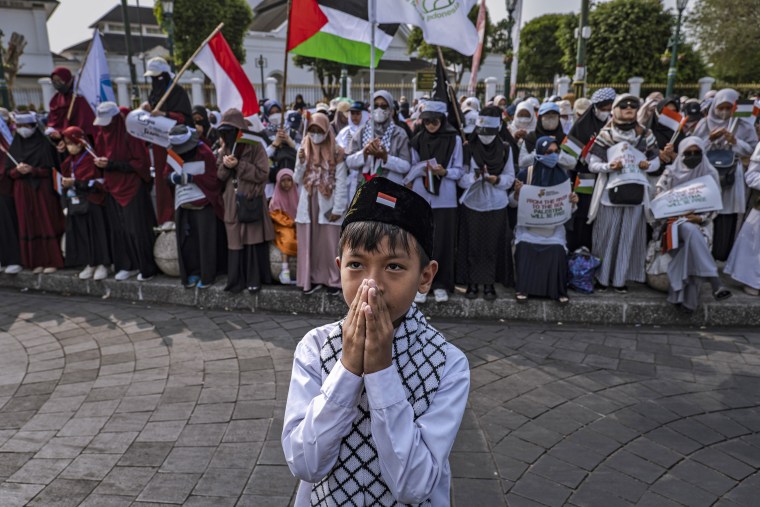
China and Russia have refrained from condemning Hamas because they are waiting to gauge the response from Muslim-majority countries, Maslov said, not just from the major oil-producing nations in the Middle East with which they have deep economic ties, but also in other parts of the world such as Indonesia and Malaysia.
“Russia will join the opinion of the majority of Arab leaders,” he said, adding that it would not want to inflame Islamic insurgents within its own borders, particularly those in the provinces of Chechnya and Dagestan.
China, which has been accused of mistreating members of its Muslim minority Uyghur community, is nonetheless a longtime Palestinian supporter that recognized the State of Palestine in 1988. But it is also trying to balance relations with Israel, which it has full diplomatic ties with.
Xi hosted Palestinian Authority President Mahmoud Abbas in Beijing in June, and Israeli Prime Minister Benjamin Netanyahu had been planning a trip to China this month before the war broke out.
As Xi seeks to expand his global influence, he has tried to position China as a potential mediator in Ukraine as well as the Middle East, a region traditionally dominated by the U.S.
China’s approach to the region “has always been very clear,” said Wang Jin, assistant director of the Institute of Middle East Studies at Northwest University in China.
“China does not look for proxies in the Middle East, does not seek to profit from the Middle East, and does not want to fill the so-called vacuum in the Middle East,” he said in an audio message on the WeChat messaging app. “This is China’s way of thinking, which is different from the United States.”
Beijing scored a surprise diplomatic victory this year when it hosted talks in which Saudi Arabia and Iran agreed to restore diplomatic relations. Xi was also a strong backer of the expansion of the BRICS grouping of emerging economies, which is adding six members next year, including Egypt, Iran, Saudi Arabia and the United Arab Emirates.
In apparent recognition of the strides China has made in the region, Secretary of State Antony Blinken urged Beijing to use its influence to prevent the Israel-Hamas war from spreading to other countries, State Department spokesperson Matthew Miller told reporters after Blinken’s Oct. 14 call with Wang, the Chinese foreign minister.
But “to be effective,” U.S. Ambassador to China Nicholas Burns said this month, “you have to stand for something.”
“It remains to be seen if China has the ability to be a true mediator, where you have to speak the truth to both sides,” he said at an event hosted by the National Committee on U.S.-China Relations on Oct. 11.
“This kind of real-world, practical diplomacy that the United States has practiced for a long time, you don’t really see the Chinese doing that,” Burns added. “So I think they’re a little bit more distant from these problems than we are.”
Beijing’s relatively muted response to the war in Gaza so far is reflected in its state media coverage, which this week was eclipsed by coverage of the Belt and Road Forum, China’s most important diplomatic event of the year.
“The story is nowhere,” said David Bandurski, director of the China Media Project, an independent research group based in Taiwan.
Chinese state media coverage of global affairs tends to emphasize Beijing’s diplomatic prowess and growing role in the world, but “it can’t really focus on Israel because it’s not really acting actively on the issue,” Bandurski said.
In the meantime, Washington’s decision to send two aircraft carriers to the region has changed the geopolitical situation, Afterman said.
“That was a very good surprise for Israel, and I think that’s something that’s been watched closely by other U.S. allies in the region,” he said.
It also sends a message to China that the U.S. is still very much present in the Middle East, he added.
While China cannot compete with the U.S. when it comes to military force, Afterman said, it could use its relationship with different actors in the region to play a role in mediation and reducing tensions.
“China is well positioned to play a role on the humanitarian issue, and by that I mean securing the release of the civilian hostages that have been kidnapped to Gaza,” he said.
Both China and Russia, which is weaker in the Middle East than it used to be, appear to be trying to keep their options open as long as possible, Afterman said.


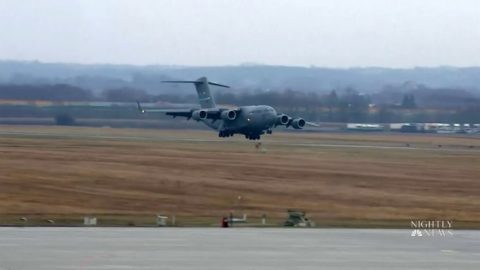

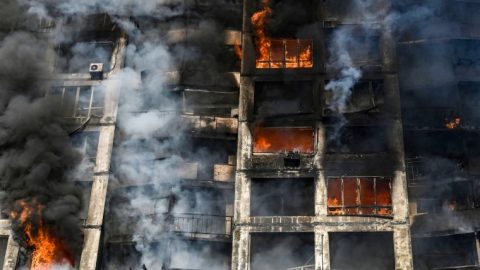
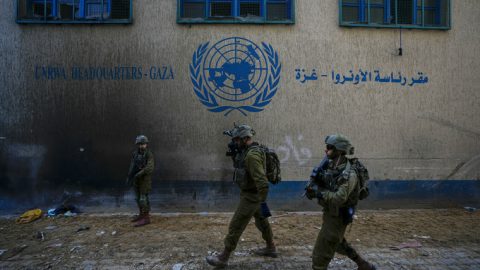
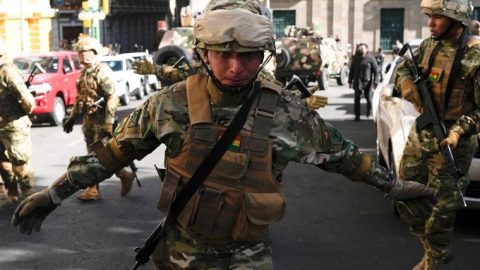

Recent Comments